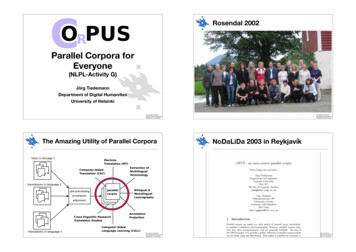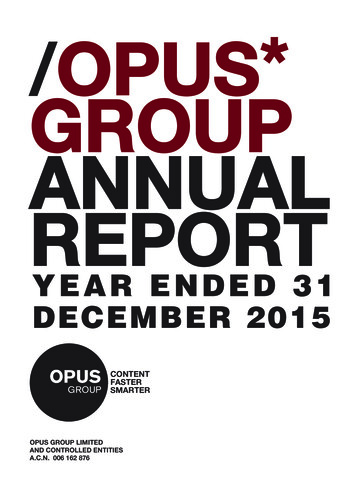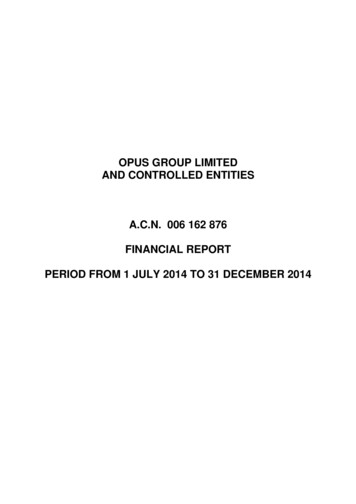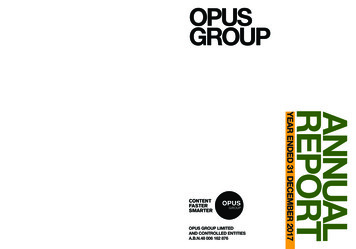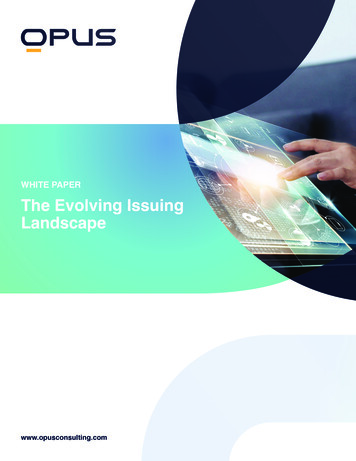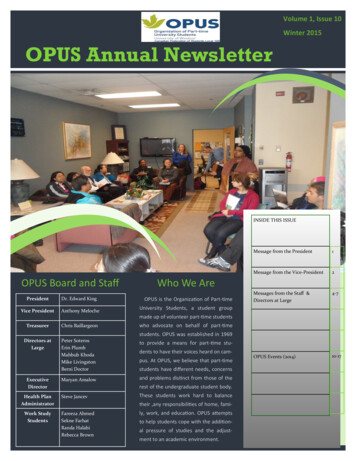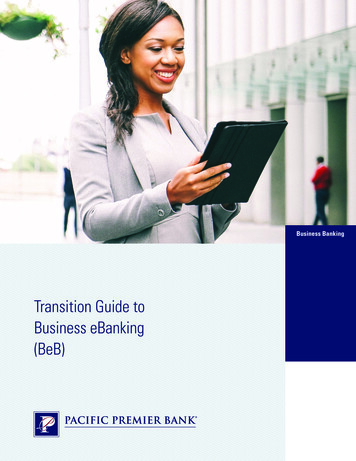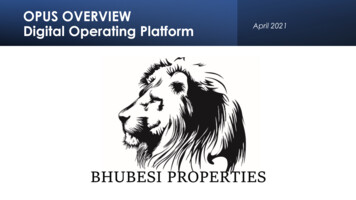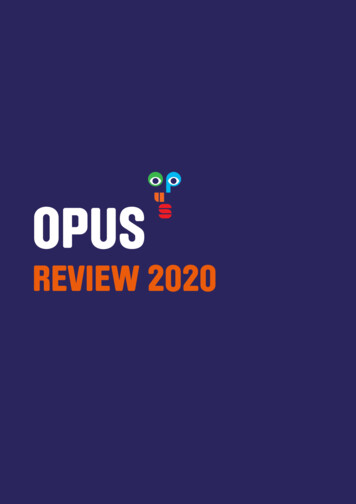
Transcription
OPUSREVIEW 2020
Executive Summary2020 has presented a series ofunique, unprecedented challenges.This review tells the story of Opusover the past 12 months - from providing an initial, emergency responseto the Covid-19 pandemic, to developing an ambitious framework forthe organisation’s future, focusingon how our work can contribute to abetter, fairer society.Opus is an independent ‘think and dotank’ based in the UK. We have spentthe last 10 years building a portfolioof work around platforms that enable diverse voices to be heard andprogressive ideas to be discussed.Our work has embraced citizenjournalism via Now Then magazine,hosted discussions through the Festival of Debate, promoted independent business and the arts and music sectors through our distributionnetwork, and shared lived, personalexperience through Wordlife events.CONTENTS2. EXECUTIVE SUMMARY3. SO? HOW WAS 2020 FOR YOU?4. 2020 - IMPACT ON OPUS5. RESPONDING TO THE CRISIS6. WE ARE ALL IN THIS TOGETHER – WELL,ACTUALLY, WE’RE NOT.7. TIME TO HEAD UPSTREAM.8. ELECTORAL REFORM AND LOCAL DEMOCRACY9. INCOME REDISTRIBUTION AND THE LOCAL ECONOMY10. ANTI-RACISM AND MARGINALISED VOICES11. PROMOTING AND COLLECTIVISING INDEPENDENT MEDIA12. CLIMATE ACTION13. NOT FOR PROFIT STRUCTURES14 . CAMBRIDGE STREET SOCIAL ENTER15 . NARRATIVES OF CHANGEDavid EdwardsThis review was collated andwritten by David Edwards.David runs a copywritingagency Wordscount (www.wordscount.co.uk). His previous experience includes managing various charities, and afailed career as a male model(he’s too short).When the pandemic hit, the collective action from individuals, groupsand organisations was inspiring, butthere was an urgent need to addresscritical gaps in the response and toadapt other elements of our work tothis new and uncertain context. ByAutumn 2020 we had: Developed an online map on theNow Then App to help people locate Covid-19 support resourcesas these emerged across the city. Taken over the communicationsrole for both Citizens Advice Sheffield and the newly formed VCSHubs group led by Voluntary Action Sheffield (VAS). Re-created the 2020 Festival ofDebate as a successful onlineevent, reaching over 40,000 people. Developed an international network of citizen-led groups advocating for a Universal BasicIncome pilot in response to thepandemic. Developed a proposal (with DINAand Union St) to transform theLeah’s Yard building into an innovative community enterprise andcultural hub. Produced content for MarketingSheffield’s Make Yourself At Homecampaign, celebrating resilienceand renewal by independent traders and the arts and voluntarysectors.Covid-19 has exacerbated the deepcracks already existing in our society – inequality, poverty, and a failingwelfare system - but at the same timewe saw a spontaneous collective response to support the most vulnerable in our community. 2020 alsosaw the global spread of communityactivism with the Black Lives Mattermovement highlighting the impactof systemic racism, and ongoing activism around the climate crisis.When the pandemic first emerged,our response was to take whatever emergency action was required.However, as the year progressed itbecame apparent that Opus’s futuredirection needed to move beyondfirefighting and focus on the morefoundational changes required toachieve a fairer, more resilient andsustainable society.Therefore as 2020 draws to a close,we have decided to organise Opus’sprojects and activities under sevenareas where we want to support andcampaign for structural change: Electoral reform and local democracy Income redistribution and thelocal economy. Anti racism and marginalisedvoices. Promoting and collectivisingindependent media. Climate action Not for profit structures Narratives of changeAlongside these changes we arealso re-purposing our membershipprogramme for organisations andindividuals, so that together we candevelop and invest in projects whichshow our mutual commitment to a‘better’ city and society.This is the story of our year.16 . RE-PURPOSING OUR MEMBERSHIP MODEL2
“SO ‑ HOW WAS 2020 FOR YOU?”2020 in SheffieldIn January 2020, Opus was heading into the new yearwith a plan based around the organisation’s existingportfolio of work (Now Then Magazine and App, theFestival of Debate, Wordlife, Opus Distribution, andthe Universal Basic Income Lab).However, it turned out that 2020 had other ideas As the number of coronavirus cases rose rapidly, Sheffield’s economy was largely shut down formonths at a time. Local independent traders, whoOpus have supported and promoted for many years,were particularly hard hit. As a consequence many,much loved establishments have had to close theirdoors, some permanently.The impacts on Sheffield’s arts and music scene wereeven more devastating. Sheffield’s theatres have beenshut since March, as have the city’s live music venues.Many musicians and artists were self-employed andwere excluded from the furlough safety net.By December 2020 over 600 people had died inSheffield from coronavirus, whilst the economic impact of the pandemic, and the inadequacies of ourbenefit system, saw ever more individuals and families suffering financial hardship. Wages in Sheffieldare significantly lower than the national average, andthis was reflected in the growing dependence onfood banks. At one point during the year, one in every150 households in Sheffield was receiving emergencyfood support.Julie Roberts, S2Food Bank“We were seeing fourtimes the number ofpeople come throughthe door in one daythan we usually sawin a week beforelockdown.”“SHEFFIELD HAS LONG BEEN KNOWN AS A REGIONWHERE WAGES ARE SIGNIFICANTLY LOWER THAN THENATIONAL AVERAGE”3S6 FOOD BANK, SHEFFIELD
With three months noticethe 2020 Festival ofDebate was changed to anonline programme, with32 live streamed events,18 specially-commissionedshort form pieces ofcontent and over 130individual speakers,reaching an audience ofover 40,000 unique views.2020 - IMPACT ON OPUSTwo major elements of Opus’s income generationare through local traders paying for advertisingin Now Then magazine and Opus’s distributionservice, placing magazines and flyers in locationsacross the region. The lockdown that started inMarch cut off both sources of revenue overnight.Wordlife and Opus music events were all cancelled, and nine months on there is still no senseof when these will be able to restart safely.In the face of all this uncertainty our first priority was the welfare of our team. We had a seriesof open conversations about how we could bestlook after each other, what we could realistically do over the coming months and how we couldachieve this. Working from home was introducedand the furlough scheme meant that we couldretain our team even when some of our workstreams were on hold.Since 2015, Opus has coordinated the Festival ofDebate, a platform co-created by communitiesin Sheffield to discuss the key social, economicand political issues of the day. The 2020 eventwas planned to be our most ambitious yet with130 events in locations across the city region,with topics ranging from the green economy tocombating racism, and speakers including GeorgeMonbiot, Kate Pickett, Gary Younge, David Lammyand Natalie Bennett. After nine months of preparation, the programme that we had been planningfor the 2020 Festival was no longer viable.The Festival of Debate was repurposed as an online event, which meant acquiring both the technical and presentational skills required to deliverthis. The results exceeded our wildest expectations.Continuing with Now Then as a print magazinewas no longer viable. Fortunately we had alreadybeen planning an upgrade for the Now Then website, so this and the Now Then App became ourmain platforms for the rest of the year.OUR NEW WEBSITE WWW.NOWTHENMAGAZINE.COM HASACHIEVED AN AUDIENCE OF 15,000 UNIQUE VISITORS AMONTH SINCE ITS LAUNCH IN JULY 2020.4
RESPONDING TO THE CRISISThe collective response to the pandemic at a locallevel was truly inspirational as informal groups andestablished agencies worked together to protect andsupport the most vulnerable members of our community. Over the last decade Opus has developed astrong network of relationships with the voluntary andcommunity sector (VCS), so when the pandemic hit,we were already in regular contact with key agencies.Our conversations with Voluntary Action Sheffield(VAS) highlighted a critical issue around signposting.With so many new informal initiatives emerging, andwith established agencies like food banks having tochange their ways of working to reflect Covid-19 restrictions, it was hard for individuals and organisationsto know where and how to access support.Alongside this work we also took on a contract providing general communications support for the VCSHubs group which VAS coordinated, with key messages disseminated via Now Then’s platforms and thelocal press.Citizens Advice Sheffield (CAS) was another agency atthe heart of the voluntary sector’s response. CAS wasfacing a significant increase in demand for its serviceswhilst also having to transition to a Covid-safe modelof working, and did not have either the resources orskillset to communicate these changes.OUR WORK MAPPING INDEPENDENT BUSINESSES WITHIN THE CITYENABLED US TO EXTEND THIS TO THE CITY-WIDE COVID-19RESPONSE. 110 COMMUNITY RESOURCES WERE LISTED, WITH THEMAP AVAILABLE ON THE NOW THEN APP AND VAS’S WEBSITE.5In March 2020, Opusagreed to provide acomprehensive communications service to CitizensAdvice Sheffield, ensuringthat people knew how toaccess the agency’s adviceservices, and maintainingthe visibility and presenceof CAS across local pressand social media.
“WE ARE ALL IN THIS TOGETHER” –WELL, ACTUALLY, WE’RE NOT A Year of Inequality and Social ActivismBlack Lives Matter and the Climate CrisisOne of the early clichés arising from the pandemicwas that everyone was equally affected by Covid-19.However, as the year progressed it became increasingly apparent that the pandemic’s impact was felt disproportionately by the most vulnerable and disadvantaged groups – those on benefits and low wages, theelderly (particularly those in care homes), Sheffield’sethnically diverse communities, tenants in poor quality, overcrowded accommodation, and those workingin public facing roles.In May 2020 an African American man, George Floyd,was killed by an American policeman. The incident,captured on video, triggered widespread protests, notonly across American cities but globally. The BlackLives Matter movement highlighted the ongoing issueof systemic racism and its impact on people of colouracross all areas of society.At the same time, the societal structures that weresupposed to support the vulnerable members of thecommunity manifestly failed. Benefits were not paid,staff in care homes and hospitals were left withoutPPE and a national, top down approach to managingthe pandemic only served to highlight the need for effective local democracy.2020 was also one of the hottest years on record, withclear evidence of irreversible changes in the ecologicalbalance of the planet. Extinction Rebellion and other environmental groups continued to campaign forthe radical changes required to meet the scale of thischallenge.At the onset of the pandemic, Opus’s focus was onemergency action, but it became evident that firefighting was not enough. 2020 has shown us that radical change is needed, but for change to last this hasto happen at a structural level.Opus has always held the core belief that we can livein a place where everyone works to make things betterfor each other. ‘Better’ to us means fair, diverse, accessible, independent and heard. We have always hadthese values – given the challenges of 2020, we wantto be clear about how these values power and shapeour work.A combination of poverty, poor housing and ethnicityresulted in some local communities having an infection rate five times higher than neighbouring areas.Photo by Chris-Henry-on-Unsplash6
“Time to head upstream ”There is a parable about a group of friends who arewalking by a river bank and see a baby drowning in theriver. They dive in to save the drowning baby, but assoon as they save one drowning baby - another one appears. The friends are very busy saving drowning babiesuntil one friend gets out of the river and begins walkingupstream.“Where are you going?” shout the friends in the river,still saving drowning babies.“I’m going upstream” she replies.The friends are aghast, “Come and help save the drowning babies” they say. “What could be more importantthan drowning babies?”The friend replies, “I’m heading upstream to find outwho is throwing babies in the river.”For Opus it is now time to head upstream As 2020 comes to an end, we are focusing more explicitly on how our work can support and contributeto the real changes that we want to see in society.Following extensive discussions within the team, wehave identified seven key areas where we want tocontribute – either through our existing projects orby developing new initiatives.7
ELECTORAL REFORM ANDLOCAL DEMOCRACYTrust in political institutions is at an all-time low. Fromrecent surveys, almost 60% of people feel that theirviews are not represented in British politics today andonly 18% said they trust political parties to “do what isright”. This disenchantment has had a significant impact on democratic engagement.Yet, over the last nine months, we have seen unparalleled levels of active citizenship at a community level.IN 2019 ONLY 31.2% OF THE ELECTORATE VOTEDIN THE SHEFFIELD CITY COUNCIL ELECTION.It is clear that the pandemic has revealed the capacityfor neighbourliness and civic action lying latent in thepopulation, and both Sheffield City Council and localcitizens have shown interest in exploring models whichaugment representative democracy processes and empower local communities.Since 2015, Opus has been active in encouraging andenhancing democratic engagement through the Festival of Debate. We are now looking to take this furtherand are consulting with key stakeholders regarding apilot based around the ‘Citizen Hubs’ model.WHAT ARE CITIZEN HUBS?Citizen Hubs are community-based, community-led spaces which host and facilitate a wide range ofdemocratic discussions using a variety of formats. The views of citizens are brought together and arethen inputted into the decision-making processes of the Local Authority and other decision-makers.The outcomes are then fed back to citizens via the Hubs and other civil society partners.8FIR VALE COMMUNITY HUBFESTIVAL OF DEBATE 2019 Citizen Hubs are designed to enhance and complement the existingsystem of representative democracy. The model would be led andco-designed by the voluntary andcommunity sector (VCS) in partnership with the Local Authority andother civil society organisations.The VCS is key to this approach given its ability to reach and engagecitizens from all walks of life and,crucially, to be genuinely trusted bythem. The Citizen Hub model is adaptableto the particular needs of individuallocal communities. The model usesa ‘menu’ of deliberative optionsincluding citizen assemblies, interactive digital spaces, creative interactions with GP surgeries, librariesand schools, ballot boxes and onthe-ground engagement, with theexact mix determined by individualhubs. Citizen Hubs would be based onlocal authority wards but deliberations would commonly take placeat a more localised, neighbourhoodlevel (approximately 5,000 people). Citizen Hubs will also need toconnect with communities of interest and specific lived experience, aswell as those of geography. Data will be collated and analysedbefore being submitted to the Local Authority, with this work undertaken by a central VCS team. Datawill be a mix of quantitative andqualitative, and collation and presentation methods need to reflectthis.Over the coming months, in collaboration with key stakeholders,we will be developing a detailedproposal for a Citizen Hub pilot inan area of Sheffield and we will beseeking funding for this work.
UBI LAB NETWORK IS THE FIRST AND BIGGEST CITIZEN-LEDGRASSROOTS MOVEMENT FOR BASIC INCOME IN THE UK. WEHAVE A RECORD OF HOSTING SUCCESSFUL EVENTS, FROM PUBLICSPEAKERS TO FULL-DAY CONFERENCES.INCOME REDISTRIBUTION ANDTHE LOCAL ECONOMYOne clear outcome of 2020 is that our current economic system is broken. Inequality has been growing steadily over the pastdecades, and the Covid-19 pandemic has justserved to reinforce these trends. In one of thewealthiest countries in the world: Over 1.2 million food parcels were distributed by food banks between April andSeptember 2020, an increase of 140% overthe past 5 years. There are 4.2 million children living in poverty. Over 5.7 million people are now receivingUniversal Credit, with 38% of this group inpaid employment.Since 2016, Opus has been promoting theconcept of a Universal Basic Income, a regular and unconditional cash payment to everyindividual, as an alternative to the currentbenefits system which is too complex, tooinflexible and leaves many recipients in extreme poverty.Although the initial focus was on Sheffield,Opus with support from the Centre for Welfare Reform has subsequently facilitatedand incubated the UBI Lab Network, witha membership of 36 citizen led Labs acrossthe UK and beyond. The network has beenestablished to collectively advocate for basicincome pilots andthe need to test policy alternatives to current social security systems.Opus provides dedicated staff time to support this network.In collaboration with Basic Income Conversation, powered by Compass, we’ve also beenworking with Baroness Natalie Bennett, BethWinter MP, Ronnie Cowan MP, Cllr PatrickBrown Cllr, Cllr Alison Teal and Christine Jardine MP to develop a new hybrid model foran All-Party Parliamentary Group, engagingregionally and nationally elected representatives and other stakeholders with the widerdebate around UBI and social security.UBI LAB NETWORKOpus has facilitated and incubated the UBI Lab Network, with a membership of 36 Labs across the UK and beyond.The network has been established to collectively advocate for basic income pilots and the need to test policy alternatives to current social security systems. The UBI Lab Network has worked directly with 13 councils, the WelshSenedd and the Northern Irish executive to pass motions in support of piloting UBI in the UK.9As the economic impact of the pandemic hit home, the UBILab Network developed a number of proposals including:As the economic impact of the pandemic hit home, the UBILab Network developed a number of proposals, actions andresources including: An emergency UBI during the Covid 19 pandemicA recovery UBI for the post-pandemic revivalUBI for Northern IrelandUBI for people with a disability UBI as a peace dividend for Northern IrelandFAQ’s & Summary of Evidence from pilotsHow to pass a Council Motion resourceIn collaboration with Basic Income Conversation (BIC) &Organise An interactive map, illustrating 17,000 testimonials from the public on UBI Worked with 13 councils to pass motions in support ofpiloting a UBI In collaboration with BIC & Basic Income UK, a mayoralcandidate pledge for 2021 elections
Supporting the local economySpending money with local businesses is a keyfactor in strengthening local economies.For the last decade Opus has been supporting and marketing local independent traders,through our various platforms. The lockdown inMarch 2020 was catastrophic for many of thesebusinesses and our immediate response was tooffer free support with publicity and marketing,as well as cancelling yearly advertising contracts and offering ‘pay as you can’ invoicing tosmaller traders.UBI Lab Network isthe first and biggestcitizen-led grassroots movement forbasic income in theUK.Opus’s other initiatives included: Convening a roundtable which enabled localbusinesses and community and arts organisations to discuss the challenges of responding to the pandemic. Supporting the Make Yourself At Home campaign launched by Marketing Sheffield topromote resilience and recovery. We havepublished articles and videos on the NowThen platforms looking at post-pandemic recovery for the arts sector, local business andcommunity organisations.FOR EVERY POUND SPENT WITH A LOCAL BUSINESS, ONAVERAGE 70P REMAINS IN THE LOCALITY, COMPARED TO ANEQUIVALENT FIGURE OF 5P FOR MULTINATIONAL COMPANIES.Sheffield City CouncilPassing a motion to support a UBI trial
ANTI-RACISM ANDMARGINALISED VOICES10The death of George Floyd in May 2020 and the global spread of the Black Lives Matter movement saw aninternational outcry against the pervasive racism whichcontinues to disfigure societies across the world. Blackpeople continue to suffer a systemic level of discrimination whether in relation to income, employment, housing, wellbeing or the criminal justice system. At the sametime the history of western societies has minimised boththe impact of slavery and colonialism, and the positivecontributions of people of colour.Tackling Racism in the Leadership PipelineAt Opus we are all too aware of the work we ourselveshave to do, both in terms of diversifying our staff teamand boards, and in expanding the range of voices heardthrough our platforms. We are committed to this task,to listening, to learning and to making a real and lastingchange. As a first step, during 2020 we sought a morediverse membership for the Opus governance boards byrecruiting 6 new members.Following-up from this conference, Opus has collaborated with VAS to author a development bid to the Talbot Trust to explore a project supporting boards thatare looking to diversify their memberships, whilst alsosupporting the development of a pipeline where peopleof colour are encouraged to consider sitting on theseboards and are provided with appropriate training andongoing support.As well as making internal changes, we also want to reflect our commitment to anti-racism in the projects thatwe choose to develop, but as a currently predominantlywhite organisation, we are mindful of the danger of engaging in issues where we do not have a lived experience. We had the opportunity to consider these issues inmore depth when we were approached by Melissa Simmonds, who runs a Sheffield-based organisation calledMisTaûght. Melissa asked us to support an online presentation and Q&A session, titled ‘Black History Monthfor Dummies and White Teachers’, following on from anevent we ran with her during Festival of Debate 2019.Working with Melissa was a very useful learning processfor us. We subsequently partnered with Learn Sheffieldto create 10 pieces of written content and 3 videos tosupport Black History Month, and we also refocused elements of the Festival of Debate programme to engagedirectly with the Black Lives Matter movement.The work will be undertaken and accountable to a groupof anti-racist organisations and organisations led bypeople of colour. The project will be co-managed byVoluntary Action Sheffield and Opus and we have beensupported in this work by Dr Muna Abdi and Rob Cotterell, Chair of Sheffield and District African CaribbeanCommunity Association.More recently we have provided financial sponsorship,marketing (including a promotional & whole conferencearchive film ) and social media support for the ‘TacklingRacism in the Leadership Pipeline’ conference led by DrMuna Abdi. There is a stark under-representation of thecity’s ethnically diverse communities on the governanceboards of public, private, community and voluntary organisations in Sheffield.While the proportion of Sheffield’spopulation who are not white isnearing 25%, the representationof those individuals and communities on leadership and governanceboards in the city is less than 4%.UBI LAB SHEFFIELD IS THE FIRST AND BIGGEST CITY-BASEDGRASSROOTS MOVEMENT FOR BASIC INCOME IN THE UK. WEHAVE A RECORD OF HOSTING SUCCESSFUL EVENTS, FROM PUBLICSPEAKERS TO FULL-DAY CONFERENCES.
PROMOTING AND COLLECTIVISINGINDEPENDENT MEDIAThere is a significant democratic deficit in the UK asa result of the concentration of media ownership. Justthree companies dominate 83% of the national newspaper market, up from 71% in 2015. The gatekeeping ofwhat is considered newsworthy and the range of ‘acceptable’ views are becoming ever narrower, with anagenda driven by multinational conglomerates linkedto specific political and commercial interests, and withthe voices of large sections of the population unrepresented.At the same time there are many, mainly local, independent media publishers who are committed to holding those in power to account and to representing thevoices of their communities, but the small scale of theseoperations limits their impact. As an independent publisher Opus, with over a decade of experience, believesthat a flourishing, diverse and accountable media is essential for a healthy democracy, and we are actively engaged in both promoting independent media to a wideraudience, and developing channels to collectivise andamplify the content from these organisations.News Club UKThis year Opus has played a key role in establishingNews Club UK, bringing together independent mediaoutlets from across the country. With our partners atThe Media Fund, Rebel Cities and Bywire, we have piloted a series of YouTube videos, featuring a live streamedseries of conversations with representatives from thebest of the UK’s independent media. Short excerptsfrom these discussions are then disseminated via social media to drive awareness of this alternative mediaoutput. There is also a News Club UK Telegram channel,where the Opus staff team aggregate the output from awide range of independent media outlets to make thiseasily accessible in one location.nowthenmagazine.comWe have recently launched a completely new website,designed as a platform capable of presenting a muchwider range and volume of content. It is now easier tofind themed articles and profiles for writers whose workis featured, and to share content through social media.Opus has a long history of supporting citizen journalism, and we are now looking to develop this work further. We have obtained funding for a Community Correspondent, who will focus on stories and issues relevantto the many Sheffield communities who are under-represented in local and national media.Community CorrespondentWe have obtained funding for a Community Correspondent, who will focus on storiesand issues relevant to the many Sheffield communities who are under-represented inlocal and national media.11THIS YEAR OPUS HAS PLAYED A KEY ROLE IN ESTABLISHING ‘NEWSCLUB UK’, BRINGING TOGETHER INDEPENDENT MEDIA OUTLETSFROM ACROSS THE COUNTRY.
CLIMATE ACTIONEven in a year with a global pandemic, theclimate crisis is an issue that demands ourimmediate attention. Our climate is changingand becoming more chaotic even faster thanwas predicted a decade ago. The loss of biodiversity, crop failure and rising temperaturesare leading to dire consequences for everyliving being and ecosystem on the planet.With the development funding in place, Opushas played an active role in recruiting thestaff roles enabled by this grant, and we havefacilitated an initial meeting of 35 differentagencies and groups who are committed tosupporting the development plan.Opus shares these concerns and 12 monthsago we made the decision to free up a significant amount of staff time to lead on a majorfunding application with Sheffield Climate Alliance (SCA). The outcome was a 200,000development grant with the aim of helpingSheffield City Region make the transition to alower carbon, happier, healthier life.Whilst scientific information is essential, it isstories, not facts, which will change heartsand minds on the issue of climate change.Opus has regularly featured climate-relatedissues in Now Then’s platforms but we arenow aiming to prioritise this area by appointing a part-time Climate Correspondent.Sheffield Climate AllianceOver an 18-month period, SCA will use thisgrant to: Develop a sustainable partnership of organisations committed to a low carbonfuture. Explore methods of improving public understanding around climate change andthe benefits of making positive change. Create Climate Action Hubs, both physicaland virtual, to explore how we can shareachievements and influence behaviour. Establish a new web portal linked to socialmedia outputs which will capture and tella low carbon story in an engaging and inspiring way.12OPUS LED ON A MAJOR FUNDING APPLICATION WITH SHEFFIELDCLIMATE ALLIANCE (SCA) TO SUCURE 200,000 DEVELOPMENTGRANT TO HELP SHEFFIELD CITY REGION TRANSITION TO A LOWERCARBON, HAPPIER, HEALTHIER LIFE.Climate CorrespondentWith a focus on the Sheffield City Region, theClimate Correspondent will focus on key climate-related developments across the Northof England, developing narratives whichconnect climate issues and climate action topeople’s lived experience, as well as championing decision-making when it is good andchallenging it when it is poor. The postholderwill also link with other independent mediapublishers, initially in the North and then nationwide, to develop shared learning and resources.Climate CorrespondentWhilst scientific information is essential, it is stories, not facts, which will change hearts andminds on the issue of climate change. Opus has regularly featured climate-related issues inNow Then’s platforms but we are now aiming to prioritise this area by appointing a part-timeClimate Correspondent.
NOT FOR PROFIT STRUCTURESThere is still a dominant narrative that private, commercial organisations are, in anycircumstances, the most efficient option, andthat a top down approach is the best way todeliver not only commercial, but public andcommunity services. This myth continuesdespite evidence such as the collapse of theglobal financial system in 2008, the failed attempt to outsource elements of the probation service and, most recently, the fiasco ofthe Covid-19 national ‘track and trace’ systemwh
S6 FOOD BANK, SHEFFIELD 2020 in Sheffield In January 2020, Opus was heading into the new year with a plan based around the organisation’s existing portfolio of work (Now Then Magazine and App, the Festival of Debate, Wordlife, Opus Distribution, and the Universal Basic Incom
